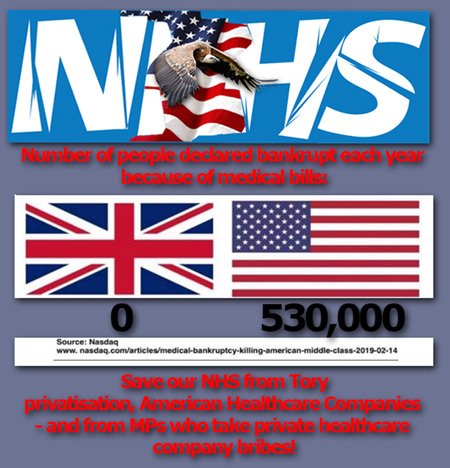The next stage in NHS reforms being forced upon the NHS started with the loss of Elective Care and it being transferred to the private sector, and the forthcoming financial freedoms which he announced last week which will mean that the American styled Integrated Care Boards (aka Accountable Care Organisations) will be free to use NHS funding in any way they see fit.
They will be free, and indeed prompted by NHS England, to commission private healthcare companies to provide NHS services, determine which healthcare services will be provided in the hospitals in their area, e.g. adding breast reduction to their list of procedures they deem to be of no value to the NHS hospitals in their area along with the already announced 31 procedures no longer available to NHS patients.

This goes back to the pre-NHS times when healthcare across the UK was patchy in terms of its availability, best practice, and in particular when maternity services were not a priority and when infant mortality and birthing mothers suffered avoidable deaths.
Furthermore, Streeting's plans to replace Hospital care with 'care in the community' copies the Thatcher brainchild of closing all NHS mental hospitals, and NHS run geriatric care homes; and transferring the services to the private sector. History shows just how bad that has gone!
Of course the intention is that such community care will be provided by the private sector who will be free to raise charges direct to patients, thereby destroying the principle of the much maligned quoted misnomer of 'free at the point of delivery', which was a Blairism designed to hide the true intent - to fool the public into believing it didn't matter who provided the healthcare as long as it was free - and to open up the NHS to its Americanisation and eventual insurance based healthcare system. It was to be hidden of course by badging everything under the NHS logo!
This of course is in-line with the famous quote of two of Thatcher's pro healthcare privatisation champions - John Redwood and Oliver Letwin:

Furthermore, NHS patients private medical records will be deemed as owned by the private companies you need to give it to in order to receive treatment - such is the US version of data ownership and protection. It can then be sold to whoever will pay for it!
The US system is based on profit and in order to deliver profit, healthcare has to be denied and unnecessary treatments e.g. surgery, drugs, and implanted devices given to patients en-masse. This ensures profitable income for Hospitals, GP Surgeries, private clinics and of course for the healthcare insurance companies.
It also means bankruptcy through unpaid medical bills for over 63,000 US citizens annually, and the subsequent loss of their homes.
The whole idea of Integrated Care Systems and their Boards came from United Health and Kaiser Pemenante's Accountable Care Organisations, with only the name changed due to the need to hide from the public that it is an American system, as prompted by Labour MP Ben Bradshaw on the Health and Social Care cross-party committee of 2017 at the time they were about to be introduced by Jeremy Hunt prior to later being made legal by the Health and Care Act 2022.
The Labour Government of 1947 gave us the Bevan version of the NHS, and now a Labour Government in 2025 is taking it away by stealth and replacing it with the American Healthcare model of bankrupt patients, avoidable deaths, unnesisary surgery, treatments, and drugs.
But that is ok as both Wes streeting and Keir Starmeer and Angela Raynor continue to get richer, being paid for by the private healthcare sector and US companies United Health et al!

But what is so wrong with the US healthcare system?
Privatisation of healthcare, especially when looking at the U.S. system, comes with a number of significant risks that have been debated for years. Here are some of the major concerns:
1. Inequity and Access Issues
- Healthcare as a commodity: In the US privatised system, healthcare becomes more of a commodity that people must purchase, rather than a universal service available to all. This can exacerbate health inequalities, where only those who can afford it get adequate care. For those without insurance or with poor coverage, medical care can become prohibitively expensive.
- Health disparities: Minority groups, low-income families, and rural populations, who often face additional barriers to healthcare, are at risk of being left behind. Privatisation could widen the gap in health outcomes.
2. Rising Costs
- Administrative complexity: One of the criticisms of the U.S. healthcare system is its complexity, with multiple private insurers, different networks, and various forms of coverage. This increases administrative costs significantly. Private insurance companies typically have high overhead, with substantial resources spent on marketing, claim processing, and denying claims, rather than focusing on patient care.
This is already happening in England as a result of the Healthcare Act 2022 which legalised
the Integrated Care Systems in England
- Profit motives: Private companies, driven by profit motives, may raise premiums, co-pays, and deductibles over time. For-profit healthcare providers might also seek to maximise revenue by providing unnecessary tests, procedures, or pushing higher-cost treatments, which can drive up the overall cost of care.
 or one of these
or one of these 
3. Quality of Care
- Underfunding of essential services: If profit is the primary driver, healthcare providers might cut corners, reduce staffing levels, or focus on high-margin treatments over more basic but necessary care. This can lead to a decline in the overall quality of healthcare.
Already occuring with the closures of Maternity Hospitals, e.g. Liverpool Women's Hospital now threatened with closure;
and lack of lack of appropriately trained mid-wives
- Fragmentation of services: With multiple private providers, care can become fragmented. Patients might not have a cohesive care plan, leading to gaps in care, miscommunications between specialists, and unnecessary tests or treatments.
- Disincentives for preventive care: Private insurers often prefer treatments that are billed in a fee-for-service model rather than focusing on prevention, which could save more money and lives in the long term. This could lead to a healthcare system that’s more focused on treating illness rather than preventing it.
4. Lack of Accountability
- Profit over patients: The emphasis on profit in a privatised system can reduce accountability. For example, if a private company prioritises profits over patient care, there might be fewer incentives to ensure quality, leading to patient harm or neglect.
- Lobbying and influence: Private insurers and healthcare corporations often have significant influence over policy decisions. This can lead to regulations and laws that prioritise their financial interests rather than the public’s health. In the U.S., the lobbying power of health insurers, pharmaceutical companies, and hospitals often results in policies that benefit them but don’t necessarily improve care or reduce costs for the average citizen.
- No Universal Data Protection Law: Unlike some countries, the U.S. does not have a single, overarching data protection law like the GDPR in the EU. Privacy laws in the U.S. are patchwork, varying by state and sector, and that applies also to patients private medical data.
NHS England has a cavalier attitude to patients private medical records, and do not abide fully by the GDPR. The so-called right to opt-out of private medical data being collected by NHS England, is null and void, if NHS England decides certain medical records need to be harvested and handed over to interested parties. This statement can be found on the NHS England website.
Furthermore, they have decided that your name, address and NHS number are NOT treated as private personal data! US Data Company has been tasked to manage a central NHS England data-bank of patient's records, which means that private healthcare companies from the US and other countries, can be given access to the data, without the individual's knowledge.
5. Financial Strain on Families
- High out-of-pocket costs: Even with insurance, individuals can face significant out-of-pocket costs, especially for high-deductible plans. Families may be forced into difficult financial situations or even bankruptcy due to medical bills.
- Uninsured or underinsured populations: A substantial number of people in the U.S. remain uninsured or underinsured, meaning they either have no coverage or don’t have coverage that adequately protects them. In the event of a major illness or emergency, this can be financially catastrophic.

Whoops! That should read, 'Labour NHS privatisation'
6. Innovation vs. Access
- Innovation as a double-edged sword: On the one hand, the U.S. system is known for cutting-edge medical research and innovation, with private companies driving technological advances. But this innovation is often tied to high costs, making it inaccessible to many. New treatments, drugs, and technologies are often priced out of reach for lower-income populations.
- Market-driven innovations: While Privatisation can spur innovation, it can also mean that resources are directed toward developing high-cost treatments rather than addressing widespread issues like basic primary care or affordable access to essential medications.
7. Moral Hazard
- Not everyone gets the same care: In a privatised system, there is often a tiered system where those with better insurance get faster and higher-quality care. This creates a system where people’s health outcomes can be determined by their financial means, which isn’t just inefficient—it’s also ethically problematic. Further, not all medical insurance provision is the same, and NONE in the US covers 100% of medical costs of those insured.
Here in the UK, NONE of the private healthcare companies provide emergency healthcare,
and NONE cover existing medical conditions
8. Public Health and Systemic Risk
- Public health issues: A fragmented, privatised system may not be as effective at tackling large-scale public health challenges. Issues like infectious disease outbreaks, mental health crises, or widespread chronic conditions require coordinated, system-wide responses, which can be difficult to achieve in a privatised, profit-driven model.
- Lack of coordination in emergencies: During crises, like the COVID-19 pandemic, the private system often proves to be less efficient and less unified than a more centralised system. In contrast, a public system may be more flexible in addressing such challenges.
In the UK, the vast majority of private healthcare clinics and facilities do NOT have Emergency Departments
with the only access to one being that of the nearest NHS hospital!
9. Moral and Ethical Concerns
- Healthcare as a right vs. a privilege: Privatisation often raises questions about whether healthcare is a fundamental human right or a service that should be bought and sold. In countries with universal healthcare, the emphasis is on ensuring access for all citizens regardless of income. In a privatised system, healthcare is often treated as something for individuals to pay for, leaving large portions of the population without access.
In the UK, voting records and the unfetted access by private healthcare lobbyists to policy makers,
shows that a substantial majority of MPs see Healthcare as a commodity
to be paid for and to profit from
Overall, while there are some who argue that privatisation can bring efficiency and innovation to the healthcare system, the risks—particularly in terms of equity, affordability, and the quality of care—are significant. The U.S. healthcare system, is riddled with systemic inequality, high costs, and inefficient care delivery.
If privatisation within the UK's NHS continues to grow, as is desired by Streeting and Starmer, these endemic failings within the US system will become the norm within the UK!
It won't happen overnight - but by stealth over the next 4 years!
Source: Hanzard / Parliment TV / They Work For You / The Gaurdian / The Telegraph / HSJ / Daily Mail / KONP / The King's Fund / McKinseys / United Health / Speaches by: Starmer / Speeches by Streeting / NHS England / Every Doctor / 999 Call for NHS / NHS For Sale
See also: Private Healthcare Companies Who Pay The Piper, Play The NHS Privatisation Tune?





 or one of these
or one of these 
